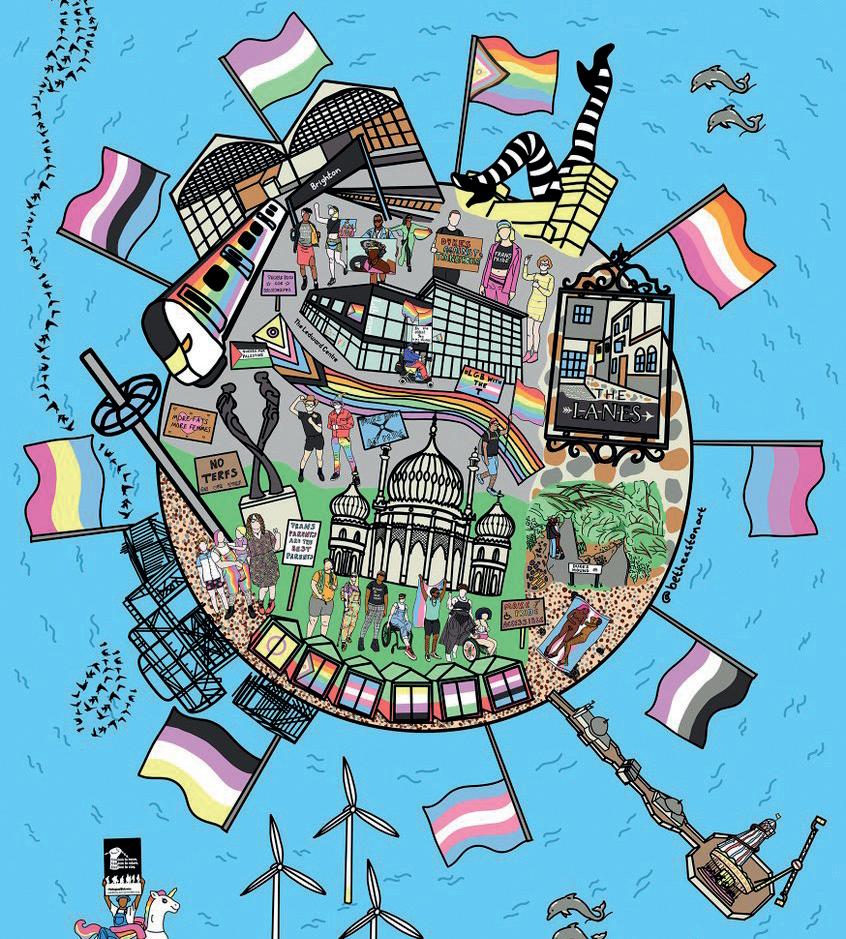14 Scene
Psychology of addiction
A JOURNEY THROUGH CHEMSEX Richard Jeneway takes about his relationship with drugs and chemsex ) Despite the
Office for National Statistics and an article in The Guardian making claims that since the high point in the ‘80s, drug use among the population has dropped from 1520% to around 9% in modern times, places like Brighton continue to be hotspots for continued substance abuse and chemical-induced sex. I often meet and mentor people who are regular substance abusers for a range of different social and economic reasons. Although today the number of users may be lower, habits from my own time still exist. My own journey with drugs started when I was 16, just smoking dope with my mates from school, which moved on to trying LSD (or acid) as a hallucinogenic drug. As a young adult I moved away from regular drug use, with the exception of a joint from time to time. When we were clubbing in the ’70s, we would use an amphetamine called Do-Dos – then available over the counter and mostly legally sold for conditions like bronchitis. Speed was a drug of preference; it was cheap and kept us going all night, but could inhibit sex play due to erectile dysfunction, so mostly a cocktail of other substances like cocaine and alcohol was required. In the ’80s ecstasy hit the scene. It was not only great for dance and clubbing, but great for sex, although I personally found that it did not work with my comedown for work on Monday morning. I refrained from using ecstasy fairly soon but for many of my friends it was their weekend drug. Then came ketamine, which is a drug associated with equine veterinary work.
In the ’90s cocaine became my drug of choice, however coke is habit forming and addictive at worst. Supply back then was easy but expensive. I lived in West London, mixing with groups who used cocaine regularly for long evenings of dance, conversation and sex again, like in the fetish and group scene. As my sight declined, I stopped smoking cigarettes and joints, preferring hash to weed, but principally for health reasons. In 2004 I stopped altogether of my own accord. The chemsex scene is active here in Brighton and I meet with people in my voluntary capacity who still use drugs for sex and other reasons. My concern is that, despite Covid, this scene has thrived with plenty of supply locally and nationally. Nowadays crystal meth, or ‘TINA’, seems the most widely used and easily accessed drug which, like most leisure drugs, offers extreme pleasure during sex. I am fully aware that, for many, drugs are part of their routine for sex but as a species humans can have an addictive nature; it is the way some brains are wired, so recognition of a problem is vital for anyone wishing to change their habits and way of life. There are, of course, various other support networks offering counselling, rehab and more. Drug use has changed over the decades and even the habits behind it, but the issues remain. I am not preaching big changes and many will need to find their own path with their substances of choice, yet, if my own experience has shown me anything, it is that the continuing decline in the number of users and frequency of that use can only be a good thing for healthier lives. Friends and family echo this trend and find their own children do not follow the drug or even alcohol habits of their generation. Perhaps this is something to be thankful for when other problems in society still rise.
The psychology of addiction is highly complex, with much debate around possible causes. Examples include biological/genetic vulnerabilities, lifestyle factors, adverse childhood experiences, and socioeconomic demographics. The term ‘addiction’ often assumes physical dependence and withdrawal. However, behavioural addictions such as gambling can have the same negative consequences, but without the physical issues faced by those with an addiction to drugs and alcohol. Following the ‘high’ of engaging in the chosen behaviour, there may be a combination of negative emotional states, including depressive symptoms, anxiety, and feelings of loneliness, guilt and shame. For some, these states can trigger a cycle of repeating the behaviour to ‘feel better’, even if only in the short term. Everyone is driven to achieve a range of basic human goods to optimise emotional wellbeing, including ‘relatedness and connection to others’, ‘happiness and a positive sense of self, ‘mastery of life experiences and gaining knowledge or skills,’ and ‘inner peace and good emotional coping’. Some people may not obtain these goods in healthy ways due to internal (eg depressive symptoms) and external obstacles (eg lack of support networks and financial instability). But the desire and drive to achieve these remain. To ensure survival, some resort to potentially harmful means, if they believe there are no alternative methods or resources available (eg cocaine alters negative mood states; use of substances during sex increases self-worth). The pandemic has significantly impacted on the personal, economic and social elements of many people’s lives and presents a complex set of external and internal obstacles that may, to a greater or lesser extent prevent some people obtaining human goods healthily, given the magnitude of psychological and lifestyle adjustment. Andi Myles-Wright CPsychol AFBPsS, British Psychological Society Chartered Psychologist and Associate Fellow in Psychology


















































